Dear Artist,
Yesterday, Carol Currie wrote, “My greatest dilemma is whether I should pursue studies at university. I am a self-taught artist and doing well on my own. My next step as an artist is to work on enough pieces to apply for galleries. Currently, I’m 25% there. I guess the ‘father’ in me says I need to have a back-up plan, and for me that would be teaching art at college or university level. I do like the idea of sharing information with colleagues as well as expanding ideas and processes. I figure that will be best done at the higher level. What do you and your readers think about colleges and universities, or should I continue on the singular path?”
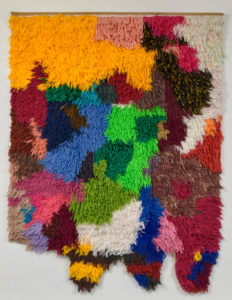
Rug 1, 2019
Handwoven fabric, natural and synthetic fabric, hair
74 4/5 × 59 1/10 inches
by Sarah Zapata (b. 1988)
Thanks for that, Carol. An aspiring creative person such as yourself begins to see that some people are cut out to be artists and others are better as arts advocates and communicators. Knowing yourself and what you really want from life is what’s important. If you’re wired for art-making you will find it difficult to go in any other direction. While I’m naturally in favor of higher education, you ought to understand the difference between artistic literacy and artistic mastery. The former can be taught and the latter must be found and developed privately. Also, the downside of higher education is the “poisonous pedagogy” that goes on these days, particularly in the art department. It has been noted by many “successful artists” that “successful artists” are those who have not been to university. Many have however received a foundation at a college, and have known when to say “enough.” Many are mainly self-taught.
Educational enrichment for its own sake — which may have nothing to do with getting a degree or providing a “back-up” — is its own reward. As Socrates said 2400 years ago, “The unexamined life is not worth living.”
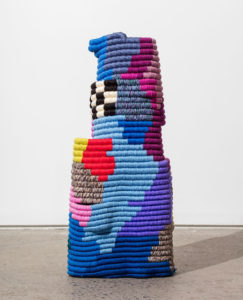
Character of Color Phenomena (Vessel), 2017
Hand coiled natural and synthetic fiber, rope
26 1/2 × 11 × 11 3/4 inches
by Sarah Zapata
If you are unsure about university I suggest that you go to a remote cabin for a finite time — six months or a year — and give yourself an intense, self-directed book-education in whatever direction your fancy takes. Take your brushes, of course, and enough canvases to sink a battleship. If you find you are going nuts without using this stuff up, you might just have your answer. The experience definitely won’t hurt you.
Best regards,
Robert
PS: “It is the mark of an educated mind to be able to entertain a thought without accepting it.” (Aristotle)
Esoterica: Currently popular examples of poisonous pedagogy include “Painting is dead.” “Cleverness is suspect.” “Angst is in.” “If you are making a decent living at art, you are probably already corrupted.” While these sorts of attitudes may have philosophic value for the examined life, they can be counterproductive to those who may wish to set their sights on being independent creators.
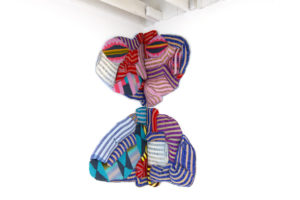
In times of mourning or social protest (2 gargoyles), 2021
Handwoven natural and synthetic fiber, handtufted cloth
53 × 33 × 5 inches
by Sarah Zapata
This letter was originally published as “The greatest dilemma” on June 29, 2004.
Have you considered a Premium Artist Listing? With each letter, an artist is featured at the bottom of this page. The Premium Artist Listings are a means of connecting artist subscribers through their work. Proceeds from each listing contribute to the production of The Painter’s Keys.
“All education must be self-education.” (Robert Henri)
Featured Workshop
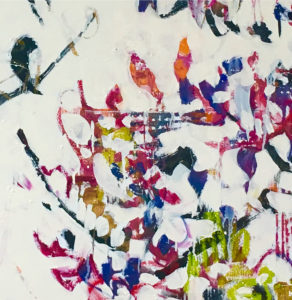 Join Ellie Harold for “Intuitive Painting: Permission to Paint Expressively,” designed especially for mature women artists of all skill levels who wish to explore this medium for soulful exploration. The retreat provides attractive accommodations (your own room!) along with lightly structured activities for centering, relaxation and low stress art-making. You’ll have plenty of free time to muse, paint, write and reflect while enjoying the colors, textures and flavors of San Miguel. This Retreat has the potential to transform not only your art but your life! You’ll return home with a specific art “care plan” to assure support for further creating. Details at www.EllieHarold.com.
Join Ellie Harold for “Intuitive Painting: Permission to Paint Expressively,” designed especially for mature women artists of all skill levels who wish to explore this medium for soulful exploration. The retreat provides attractive accommodations (your own room!) along with lightly structured activities for centering, relaxation and low stress art-making. You’ll have plenty of free time to muse, paint, write and reflect while enjoying the colors, textures and flavors of San Miguel. This Retreat has the potential to transform not only your art but your life! You’ll return home with a specific art “care plan” to assure support for further creating. Details at www.EllieHarold.com.
Featured Artist
Painting is my passion and joy. My process is intuitive, though informed by good composition and design principles. I paint what I remember, or think about, or feel, or just what comes off my hands to the brush to the canvas. Texture and color are of primary importance to me. I typically choose my support, texture it, select my palette, and go. There is nothing more satisfying to me than watching paint run and move. I love the surprises. I experiment and learn constantly. It is a remarkable journey. One I am pleased to share with you.

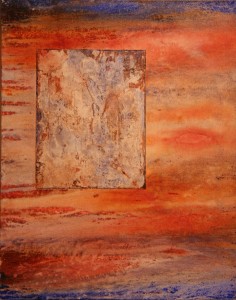


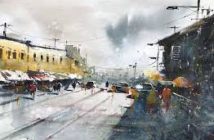
23 Comments
Such a helpful post! I applied for the MFA program at a prestigious school in my city but wasn’t accepted. When I saw the work coming out of there – installation art with W-tips or saliva or whatever, I was relieved I hadn’t spent my $40K in that direction. It just isn’t the kind of art I’m drawn towards. In the meantime, I’ve taken skills based classes and have worked endlessly on my own, including artist residencies which serves as my 6 months in a cabin that Robert recommended. I’ve been supporting myself as a full time artist (by the skin of my teeth, but that’s OK!) for the last ten years. It was the right choice for me.
Wow! I agree, one of the greatest dilemmas for artists. I made this decision when I was so young (17 years old) and just graduating from high school after three years of adult night classes in a oil painting. With the help of my instructor, and a few exercises, I made the decision not to go on to Art college but to continue to hand pick my teachers right up until 14 years ago when my last teacher passed away. (Then I went on to teach oil painting to others for four years, my way of giving back.) This was the right approach for me do to available money to go to school and children to feed. I did other degrees related to my day job and continued with painting on the side until 2010. Then I went full-time into my art career with some secure income coming in from elsewhere. But, I still ponder what I might have done had I gone into art college right away. How would my life have been different? It is a question that there is no real answer to and I have no regrets… just curiosity. I am fairly confident my work would still be my work as I have always been incredibly internally motivated and directed. But still… what if?….
What happened to Carol? Is she out there reading this letter and can she fill us in?
I, too, wonder how Carol chose.
Search for the right context of the art education that you are interested in getting Skills based programs are out there to build the Academy style preparation for work that is traditional and very naturalistic
I believe that one needs to see a lot of art work in the flesh in museums and spend time drawing from these great works to help uncover some the underlying traits that are not seen in a brief glance walking down the gallery
If you count up the number of new MFA graduates coming from schools each year and compare it to the number of teaching positions you can see that it’s not a guarantee that you will get a full time job in art Adjunct faculty are like indentured servitude with lots of hours and low pay
So, paint because you are passionate about it and as Graham Nickson has said as Dean of the NYSS ” have ambition for the work not the career ” and I agree
Yes
Only go to art school or get a BFA/MFA if you are interested in art theory and contemporary art ideas. Don’t go for an advanced degree thinking you will get a teaching job at a college or university. If you are past 40 and have not been to a top school, you will not be hired full time. Adjunct positions are the norm. You will be a migrant laborer for higher education. I don’t consider the wild ideas poison nor the installations outrageous, pushing the boundaries of art is valid, but if you are interested in making and selling traditional art, then you are better off studying with artists you admire and following Robert’s advice.
I’m sure some of that is out there. Personally I went to Otis and through them spent a term at Parsons in New York. That was one of the best decisions of my life. I met wonderful instructors that challenged and guided me. I was surround by artists as passionate as I was, which was its own education. And most importantly, I was submerged in daily art practice for several years. My skills skyrocketed. I was early on my path so this may not be the case for you. I would suggest applying for som artist in residency programs to secure time to creat you art, begin entering shows if you haven’t already. Good luck to you.
Many highly accomplished artist teach outside university also. It’s a good extra income stream, and these artist can teach for their years of experience and their special techniques can be shared. We have college professors come to us too. The artists I work with in teaching to adults on a freelance basis all have masters degrees but one. It is not vital to get the BFA and/or masters, but it helps to get the basic foundations in art. My degree is teaching art to adults in community college. I never taught in 2y college degree programs, but it helped me to develop educational programs for adults outside the mainstream and we are very successful and not tied to the dreaded bureaucracy of formal institutions. And we also have plenty of time to make art. So teaching can be creative if you make it so.
Fleta
If you think you want to teach in a college, then a college degree is a must.
If you want to be an artist, I suggest that you will be better served by the atelier system. Your art making foundation will be more solid and you will have more control over your experience and direction.
That is my hind-sight recommendation based on my experience in the college system. I had some dedicated professors who were interested and helpful in developing my talents. Others were downright poisonous. I found that the college system comes fraught with politics (both institutionally internal and external) and political correctness that are not in the service of your art and tend to color instruction adversely. The college art experience leans toward theory more than practical craft. College tenure tends to make for lazy and indifferent instructors as well. I had 25% of instructors who were interested, engaged and dedicated to the craft of teaching as much as they were to art making. The rest were there to get a paycheck to further their dreams and resented being “stuck” in the job. UCLA did a study in the late 1990s that revealed that 95% of those who got an MFA were not even making art at any level five years after graduation. Chew on that data carefully as you make your choice and count the cost. I suspect that the statistics haven’t changed much.
My personal college experience overall was not worth the expense of time, money, and tears. While I am grateful for the help and advancement I attained under the tutelage of my cherished 25% of dedicated teachers, it has taken me nearly a decade to find the joy in making art again after experiencing the destructive influence of the other 75%. It has been a long haul to find and believe in myself as an artist again, but I am happy to be one of the 5% that has persisted.
Searching Carol Currie on Google, you will find the incredible story of her life, including how she became a left-handed artist after a brain tumor robbed her of the use of her right hand.
Thank you Pam!!!!
I don’t view this as an either/or choice, personally. I know many successful artists who also teach. Most of them, in fact. This income allows them to be able to paint more, not less. I’m currently planning to go to a university and take more classes, because I’ve found college-level courses taught me more than most classes or workshops I took at non-accredited places. The homework, especially. Instructors made me do some things I did not want to do … and I learned from that. Some made me work large. Another made me copy a Caravaggio in watercolor. Then it is always my choice as to whether I want to incorporate these new skills into my work going forward or not. I’ve also found that many of the non-accredited ateliers and art centers will only hire instructors with degrees.
Some teach full-time; many teach part-time or workshops. But they teach. Most tell me that it helps them in their painting, because they have to think about what they are doing in order to explain it.
Such a good question! I have picked my teachers since 2 semesters in Life drawing with a marvellous teacher in 1969. I have learned so much, researched so m much on my own, including a year in France studying Matisse, Raoul Duffy, VanDogen and Fernand Léger. The best teachers underlined my strengths (including Robert) and pushed me beyond my knowledge. I don’t want to paint like anyone else or become a good copier. In pursuing my own goals, I’ve created some great pieces and some not so good. I keep looking at the good ones to remind myself that painting is not really a choice for me but a passion I must pursue. Though I’ve not made a living at it, I have sold quite a bit of art in my life time and made others happy. I teach French PT. I was not meant to teach art though I tried while part of and Art Society.
For all those wondering what Carol decided, check out her Facebook page.
I chose to get my BFA after working 25 years in an unrelated business. Never regretted it. My father was an artist. The smell of paint and exploring a new art project has always been part of my life. What I loved most at university was being with other art passionate students. Seeing the uniqueness of each artistic interpretation of an assignment was inspiring. I also loved learning about the history of art. I still miss seeing the varied artistic perspectives of a given subject in others work.
I suppose because I’d not had to generate income from art made it easier for me to absorb the useful lessons at school and disregard those that felt less meaningful. Getting a degree in art does not guarantee a better income or make your artworks more valuable. For me, the vastness for creative exploration in life is truly humbling and infinitely fascinating.
People in my small community come to me for art lessons. Not because I have a degree but because what I learned is useful in empowering them with their art and creative endeavors. Though it was never my intention to teach, the gift of releasing the need to be exclusively unique as an artist is freeing and expands my creativity. For my father it was not so.
Could I have done this without my university experience? Perhaps.
I went to an art college; then university to teach art – all the styles, history of art movements et al add to one’s art persona and abilities. I would just say that attending an art college or learning under a particular teacher broadens one’s knowledge and understanding. If a particular teacher does not “ring one’s chimes,” then take it for what it is and move on. I do think understanding the principles of art and design is important in the critiquing of one’s work – and/or if
one is teaching. Also, knowing the past (historic) art movements is an important part of one’s art education. Also, in an art college, the student gets to try different materials, thus finding those that resonate and which the artist will probably incorporate (as tools) into one’s creative repertoire – or open the door to something new and exciting.
As someone who included several university-level art classes in pursuit of a degree – including post-graduate, I consider those classes an integral and valuable part of my overall art education. I still use some of the principles and techniques I learned in those classes. On the other hand, while participating in a major art show several years ago I met a young woman who had recently graduated from an art school in California. She was showing a number of large beautiful canvasses and I went to talk to her about her terrific work. I was surprised to discover that not one canvas was signed. I asked her why and she replied that she was taught in art school that a signature on a work of art was a gauche commercial artifice that served only as an ego device. I said well, my dear, if you want somebody to buy your paintings and for them to have a value, you’d better forget that “art school crap” and sign your work. She did, and has been successfully selling her work ever since. My point: art school can be a liberating, exciting experience for an aspiring artist, but don’t take the advice too seriously.
I suggest a good book,”The Shape of Content” by Ben Shahn.
One of the blessing of age is being able to look back on our paths and all the choices made. There was a time when I needed to be told to “go to your room” and “just do it” because I was caught in the belief that I needed to fill my brain file with art information in order to gain confidence I really am an artist. I took workshop after workshop, classes that began to feel more like social gatherings than artistic learning. I remember once saying, I’m finding what I am learning from instructors is who’s bad and good habits in the studio are better than mine. I wish I had gone to art colleges so that I had a framed diploma hung next to all those ribbons that really have nothing to do with what I do at the easel. Robert Genn was, and still is, my all time art hero!
I think you can do as many things as you want to!
If you are already a Good Painyer by your own lights, keep going! Paint! If you have representation that produces some sales and you want that? Keep on showing there. If you are entering shows and
Winning awards and feels good to you? Keep
Entering! If you are taking classes and learning
Good stuff, keep going. Try other teachers and workshops that appeal to you! If you have things to teach and a venue to teach them, go and teach!!!!
If you have kids or grandkids or neighbors who want
To learn what you know, teach them. If you have the
Tech available make a video!
Just keep growing wherever you are. Keep
Giving whatever you have to give. Never stop
Seeking the power of the Divine. Be happy!
Caroline Médina.
I’ve gotten degrees in art fields, taught as an adjunct, freelanced as an illustrator, gotten signature status locally, taken many workshops. All of this while getting graduate degrees and a “day job” as an engineer. If I were to give life advice to a very talented young person, it would be to get credentials to allow you to eat and satisfy animal and social needs; this will give you the freedom to study and practice to satisfy your creative curiosity. Struggling to make a living as an artist is likely to sour you on your career, particularly if you have some success and are “trapped” by the demands and restrictions of the art markets or the academic world.